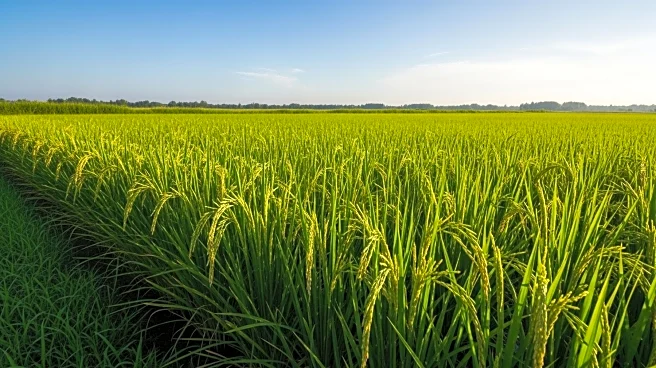What's Happening?
In Vietnam, recent field trials have showcased promising new rice varieties that offer higher yields, improved grain quality, and enhanced resilience to pests, diseases, and climate change. These trials, conducted in Can Tho, involved 785 exotic rice accessions from the International Rice Genebank (IRG) and were led by the Cuu Long Delta Rice Research Institute (CLRRI) and the Field Crops Research Institute (FCRI). The initiative builds on previous work with African rice accessions and materials from the Philippine Rice Research Institute. The IRG's diverse genetic resources are being utilized to enhance breeding efforts, providing scientists with access to traits that improve yield, quality, and stress tolerance. Promising rice lines identified through participatory selection will advance to partner breeding programs and be tested in farmer-managed fields. Notably, FCRI has identified lines suitable for organic cultivation, reducing reliance on chemical fertilizers and offering environmentally friendly options for farmers.
Why It's Important?
The development of climate-resilient rice varieties is crucial for ensuring food security in regions vulnerable to climate change. By enhancing the resilience of rice crops, these innovations can help stabilize yields and improve the livelihoods of farmers in Vietnam and potentially other regions. The focus on organic cultivation aligns with global trends towards sustainable agriculture, reducing environmental impact and promoting biodiversity. This initiative also highlights the importance of international collaboration in agricultural research, as seen in the involvement of institutions from Lao PDR and Vietnam. The successful implementation of these new varieties could serve as a model for other countries facing similar agricultural challenges.
What's Next?
The promising rice lines identified will move into partner breeding programs for further testing in real-world conditions. This next phase will involve farmer-managed fields to confirm the performance of these varieties. The continued collaboration between regional research institutes and international partners will be essential in refining these varieties and ensuring their successful adoption by farmers. Additionally, the focus on organic cultivation may encourage further research into sustainable farming practices, potentially influencing agricultural policies and practices in the region.
Beyond the Headlines
The development of climate-resilient rice varieties could have long-term implications for global food security, particularly in regions heavily dependent on rice as a staple crop. The shift towards organic cultivation may also drive changes in consumer preferences and market demands, influencing the agricultural supply chain. Furthermore, the success of these trials could encourage other countries to invest in similar research initiatives, fostering a more resilient global agricultural system.









